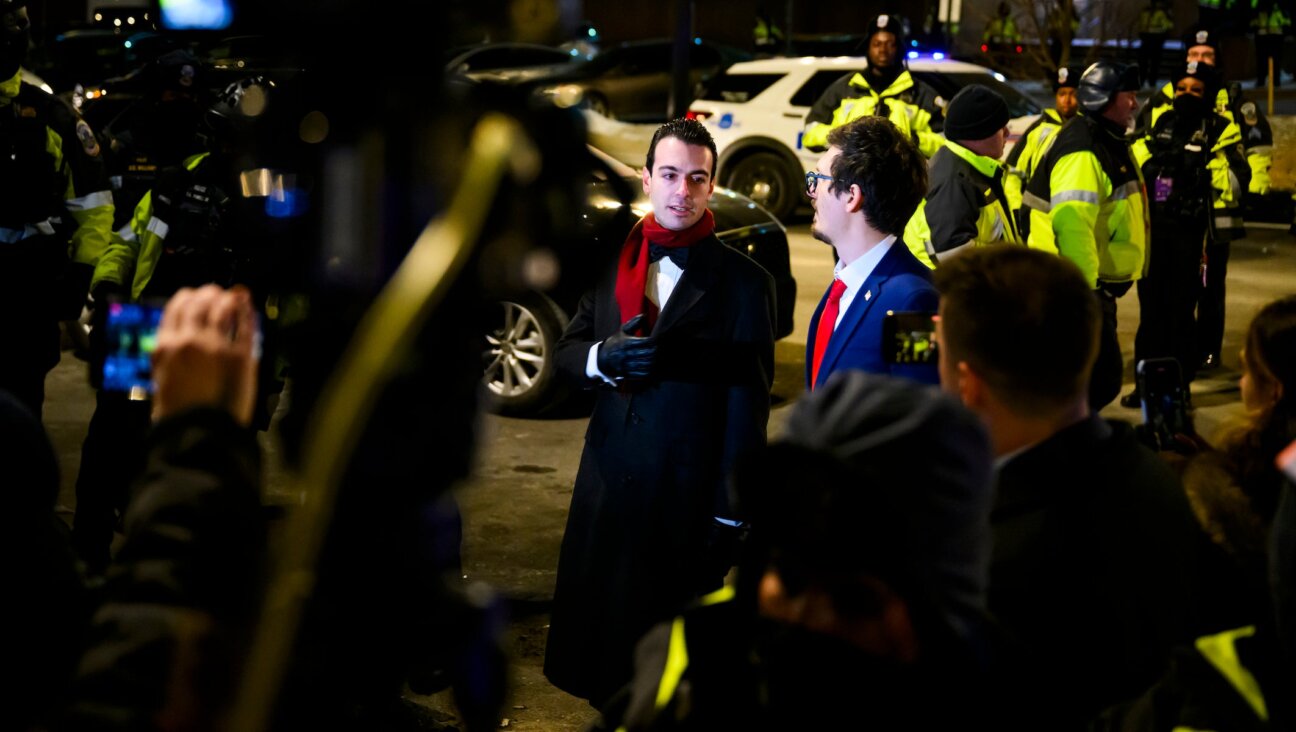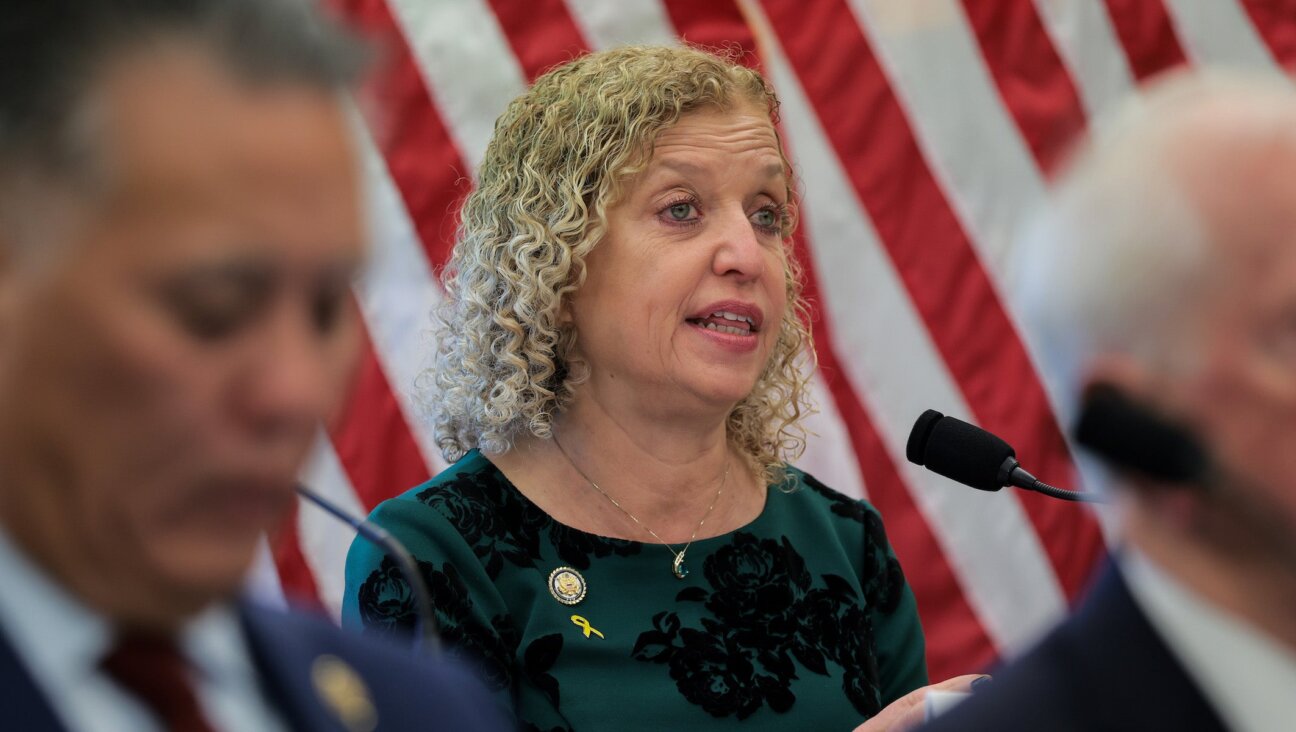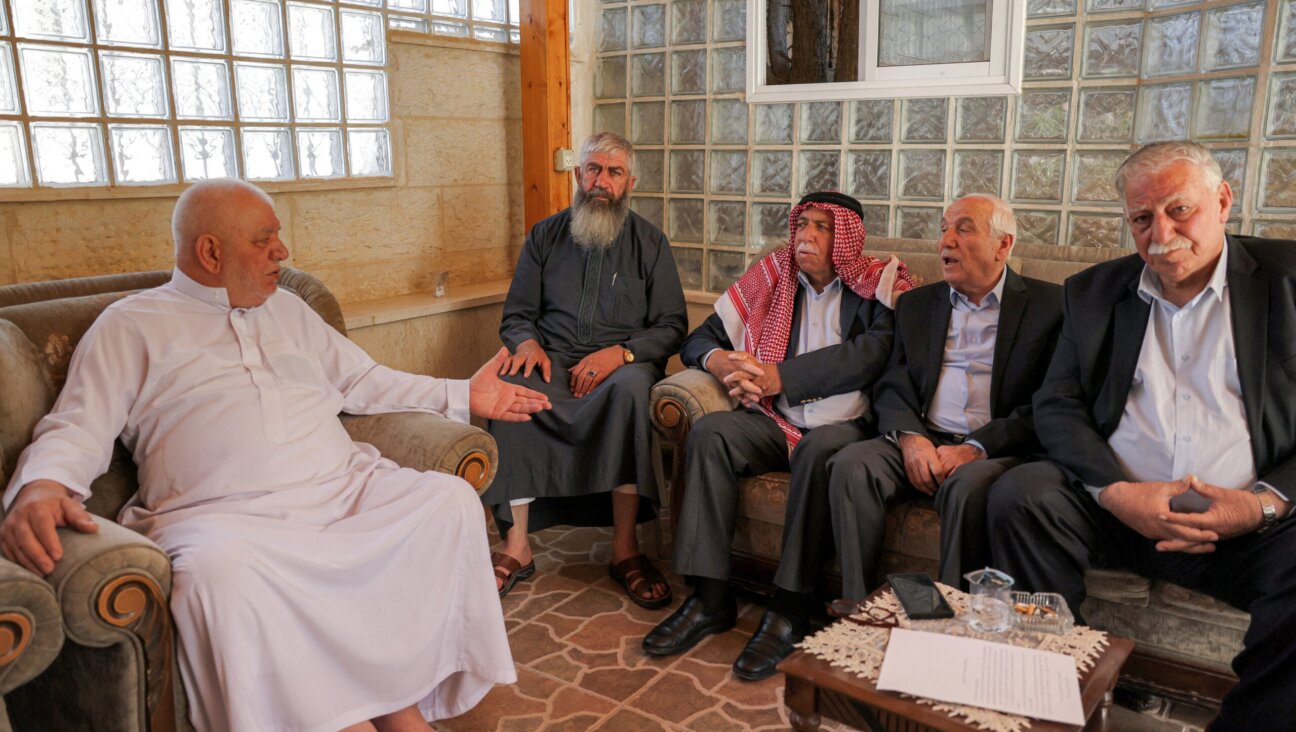Joe Biden won’t budge on this make-or-break Iran deal issue, and progressives are furious
Liberal groups argue that delisting the Iranian Revolutionary Guard Corps from the U.S. terrorism list isn’t a big deal and are pressuring Biden to do so.
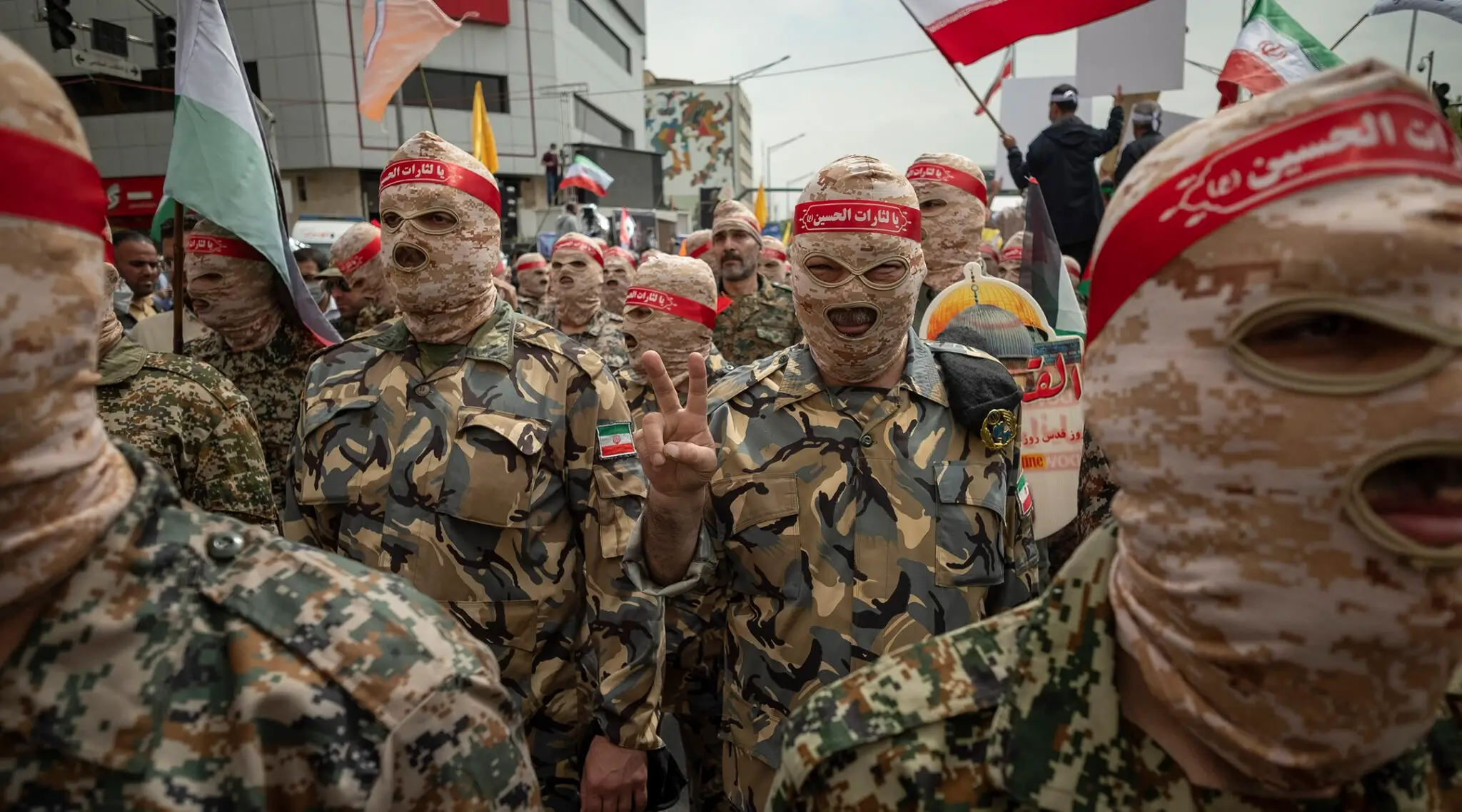
An Islamic Revolutionary Guard Corps (IRGC) member flashes a victory sign during a rally commemorating the International Quds Day, also known as the Jerusalem day, in downtown Tehran, April 29, 2022. Photo by Morteza Nikoubazl/NurPhoto via Getty Images
WASHINGTON (JTA) — An extraordinary debate took place recently in the Senate about whether the United States should remove the Iranian Revolutionary Guards Corps from its list of designated foreign terrorist organizations.
On the one side was Antony Blinken, the U.S. secretary of state, arguing that Iran was not taking the necessary steps to remove one of its principal militias from the list. Arguing on the other side, that putting the IRGC on the list in the first place was counterproductive, was … Antony Blinken.
“The gain was minimal and the pain was potentially great,” Blinken said at a hearing last month. “The designation does not really gain you much because there are myriad other sanctions on the IRGC.”
Sec. Blinken made the case that listing #Iran’s IRGC on Foreign Terrorist Org. had minimal impact on the force. its main consequence he said was a travel ban for IRGC generals who have no intention of travel while millions of conscripts are banned from US pic.twitter.com/1sOeJXVdgU
— Bahman Kalbasi (@BahmanKalbasi) April 26, 2022
The two-minute video outtake from Blinken’s appearance quickly circulated among congressional staffers and lawmakers who are closely tracking how or whether the Biden administration plans to reenter the Iran nuclear deal, congressional insiders said. Former President Donald Trump pulled out of the deal — which in 2015 rolled back sanctions on Iran in exchange for restrictions on its nuclear activity — in 2018.
Delisting the IRGC from the U.S. terrorism list, after it was put there by Trump in 2019, has become a make-or-break issue in the nuclear deal negotiations in Vienna, Iran’s team has made clear.
Those negotiations, which until recently seemed nearly complete, have come to a standstill because Biden is loath to capitulate on the issue. The IRGC is a major component of Iran’s military, designated as the protector of Iran’s Islamic identity forged after the 1979 revolution. But the militia goes far beyond preparing for combat; it has over the decades become a quasi-governmental institution, overseeing parts of Iran’s economy, industry and energy sectors. It regularly calls for Israel’s destruction, and it backs terrorist groups and insurgents around the world with money, training and guidance.
Along with Republicans, many moderate Democrats, already wary of rejoining the nuclear deal they say goes too easy on Iran, are urging Biden to stand firm on the IRGC. Biden, a foreign policy moderate himself, is believed to be personally resistant to delisting, in part because he met Iraq war veterans through his late son, Beau, and heard vicious stories about IRGC-trained militias. But Biden also vocally supported reentering the deal prior to his coming into office, seeing it as the best means of keeping Iran from going nuclear.
Blinken’s back and forth underscores how fraught the issue has become in the administration: on the one hand, keeping the IRGC on the list looks tough but potentially scuttles the deal; on the other, delisting the group achieves a key foreign policy goal but looks weak on international terrorism.
“The IRGC is a terrorist organization, and it should be designated as such,” Rep. Elaine Luria, a Jewish Navy veteran and House representative from Virginia, told the Jewish Telegraphic Agency in an email. “They have fired missiles at a U.S. consulate, supplied weapons that killed thousands of American soldiers, and continue to destabilize the Middle East.”
Adding to the pressure, Biden is about to visit Israel next month for the first time as president. Israeli Prime Minister Naftali Bennett has made clear that discussing the IRGC is very much on their agenda.
“I am sure that President Biden, who is a true friend of Israel and cares about its security, will not allow the IRGC to be removed from the list of terrorist organizations,” Bennett said in his statement announcing the Biden visit. “Israel has clarified its position on the issue: The IRGC is the largest terrorist organization in the world.”
Sign up for JTA’s Daily Briefing for the latest headlines.
In his remarks, Blinken said that the core sanctions that getting placed on the U.S. terrorism list adds are travel restrictions, and “the people who are the real bad guys have no intention of traveling here anyway.”’ Placement on the list also makes it illegal for U.S. entities to deal with the IRGC in any financial way.
The IRGC is the only state military on the U.S. Foreign Terrorism Organizations list, something that infuriates Tehran.
But U.S. progressives are also furious, because they argue the FTO debate is a meaningless obstruction in the way of a foreign policy priority. Congressional insiders say progressives in and out of Congress are pressing Biden to lift the designation.
Matt Duss, foreign policy adviser to Sen. Bernie Sanders, said Biden has fallen into a political trap set by Trump.
“The Trump gang was pretty clear that the point of this entirely symbolic designation was to raise political costs for rejoining the JCPOA,” Duss said, referring to the Iran deal’s formal name, the Joint Comprehensive Plan of Action. “They were betting that a future administration would be too scared to take the necessary steps to get back to the deal. They are being proved correct.”
After Trump exited the deal, Iran retaliated by ending some of the agreement’s provisions and is now believed to be closer than ever to enriching nuclear fissile material to near weapons level.
“The Iran nuclear agreement successfully blocked off Iran’s pathways to a nuclear weapon — until President Trump recklessly withdrew America from it,” Rep. Ro Khanna, a leading progressive Democrat in California, wrote in an email. “All of us in Congress should support U.S. Envoy Rob Malley’s efforts [in Vienna] to peacefully guard against a nuclear-armed Iran and another war in the region, and not let politicized bluster get in the way of what may be our last chance to get that done.”
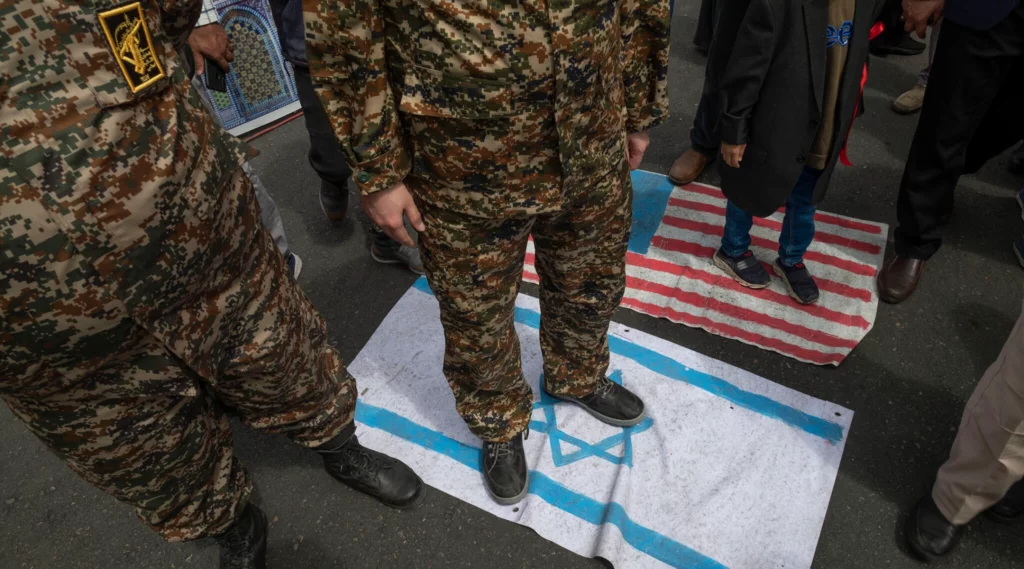
IRGC military personnel stand on Israeli and American flags during a rally commemorating the International Quds Day, in downtown Tehran, April 29, 2022. (Morteza Nikoubazl/NurPhoto via Getty Images)
The problem, according to a Democratic congressional staffer who is closely monitoring the talks, is that there is no political upside to lifting the designation, especially if an American soldier dies in an Iranian-backed attack.
“Some poor kid is gonna get killed by an Iranian drone and that kid will be the face of every television commercial for the next three years,” said the staffer, who asked for anonymity to speak freely.
One possible compromise, the staffer added, is to keep the IRGC’s Quds Force, its external operations arm, on the terrorist list while delisting the broader organization. It’s not clear if this would appease Iran’s negotiating team.
J Street, the liberal Jewish Middle East policy group which backs reentry, said that fears of political blowback are unmerited.
“Poll after poll shows that not only a majority of voters overall but a super majority of Democrats and a super majority of Jewish Americans want the deal restored, and it’s important to remember that not one lawmaker who voted for the deal in 2015 lost their seat to someone who opposed the deal in 2016,” said Dylan Williams, J Street’s senior vice president for policy, noting that at the time, some figures close to the American Israel Public Affairs Committee predicted electoral consequences for Democrats who favored the deal.
“I think it’s also clear that Republicans will attack any outcome, whether there is a deal or no deal,” he added.
This article originally appeared on JTA.org.








